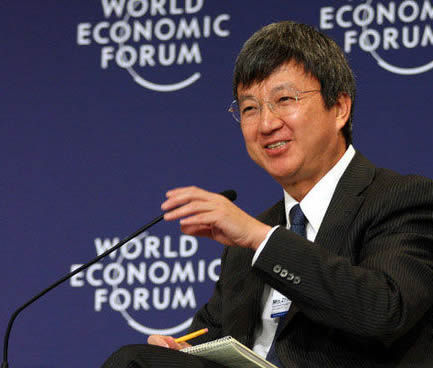Zhu's appointment a small but meaningful change at IMF
- By Huang Shuo
 0 Comment(s)
0 Comment(s) Print
Print E-mail
China.org.cn, July 26, 2011
E-mail
China.org.cn, July 26, 2011
 |
| Zhu Min [file photo] |
On Tuesday, Zhu Min became the first Chinese citizen to hold a senior position at the International Monetary Fund as deputy managing director.
Zhu, who had held top positions at China's central bank, the People's Bank of China, as well as the Bank of China, one of China's big four state-owned banks, first joined the IMF a year ago as a special adviser to ex-chief Dominique Strauss-Kahn.
When the new director, Christine Lagarde, assumed her role earlier this month, she proposed that Zhu assume his duties in the newly created position. Some analysts believe that Zhu will play an important role in working with other members of the management team and in strengthening the IMF's understanding of Asia and emerging markets.
Lagarde's recommendation shows the IMF is now recognizing a fast-growing and increasingly influential China on the world stage. For China, which acts as a major representative of emerging economies and which has been trying to gain a louder voice in international affairs, Zhu's appointment is a good opportunity to have a bigger influence in the IMF's decision-making process.
The IMF has thus far paid little attention to bringing non-Western partners into its management team. The U.S. still holds enormous power over the organization, including the sole right to veto, which is directly related to its investment in the organization.
The IMF is also basically controlled by Western countries. After the U.S. dollar became the dominant currency, the IMF became a tool for Western countries to manipulate the world's economy. But current economic situations that have presented unprecedented difficulties may require the IMF to change its internal system, which has been unfairly weighted toward the U.S. and Europe. Zhu's appointment could contribute a lot toward IMF reform by highlighting voices and suggestions from emerging countries.
Some nations, including China, have continuously called measures such as increasing the strength of developing countries to reforming the appointments system after the international financial crisis in 2008. That a Chinese has been appointed a senior position within the organization shows that improvements are being made.
But a deputy still cannot radically alter current rules. It is unlikely that Zhu will be able to use his limited power to protect Chinese interests when they collide with those of other nations. Furthermore, Zhu's promotion could even be a deal between China and the IMF. Since China has been given what it wanted, the U.S. and Europe may be more reluctant to promote further reform. But Zhu's appointment at the very least is a small change in attitude toward emerging economies.
Although Zhu's position in the IMF may not bring many benefits for China and will not fundamentally change the IMF's power structure, it can still be seen as an honor for China and the Chinese. How to make full use of Zhu's role at the IMF remains a test for Chinese authorities.
Huang Shuo is a Beijing-based freelance writer and current affairs commentator. He can be reached at larryhuangshuo@yahoo.com.
Opinion articles reflect the views of their authors, not necessarily those of China.org.cn.






Go to Forum >>0 Comment(s)